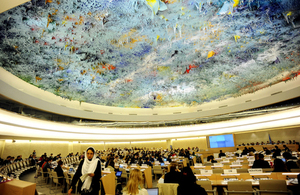Human Rights Council 36: Hazardous Waste
This UK statement was delivered at the 36th session of the Human Rights Council during the Interactive Dialogue with the Special Rapporteur on Hazardous Waste on 13 September 2017.

The Human Rights Council takes place at the Palais des Nations in Geneva
During his trip to the UK, the Special Rapporteur will have observed that whilst there are shared outcomes for protecting and improving the environment and communities, there are differences between individual administrations in how environmental regulations are framed and delivered.
We are disappointed with some aspects of the report. The UK takes it responsibilities seriously and will continue to do so.
We note that the Special Rapporteur is concerned about the possible effect on current environmental standards of the UK leaving the European Union. The Government has made clear that protecting our environment will form an important part of the EU exit negotiations.
We are committed to safeguarding and improving environmental protections. The Withdrawal Bill will make sure existing EU environmental law continues to have effect in UK law, providing maximum certainty as we leave the EU. In most cases the UK is a Party in its own right to Conventions and treaties on chemicals and pesticides, and participates actively at the international level.
We note the Report’s comments on air quality. This has improved significantly over recent decades - beginning with the Clean Air Act in 1956 before the UK joined the EU and will continue after it leaves.
In 2016, Thérèse Coffey, Minister for the Environment, wrote to 230 local authorities to encourage them to share good practice and challenges in tackling local air quality, and to make best use of their existing powers.
Our most immediate air quality challenge is nitrogen dioxide around some roads, and as part of our new air quality plan, we are requiring specified local authorities in England to produce initial plans by the end of March 2018 and final plans by the end of 2018, supported by a new £255 million implementation fund, among other funding options.
The devolved administrations are also supporting local authorities and public transport providers via central guidance and access to various grant funding schemes.
The Government will bring forward a Clean Growth Plan this autumn and we are preparing an Air Quality Strategy for 2018. That will set out our international commitments to significantly reduce emissions of five damaging air pollutants by 2020 and 2030. We will continue to work with medical and public health experts to identify policy options, securing real public health benefits.
Shale gas development is at a very early stage in the UK. While the UK Government is encouraging exploration in England, we have always been clear that shale gas will only be developed in a manner that is safe –for the environment and for people. The devolved administrations have adopted markedly different approaches to the UK Government and are not supporting shale developments at this time.
Hydraulic fracturing and drilling cannot take place without operators fulfilling a number of requirements and obtaining a number of permissions from both regulators and the UK Government. This includes environmental impact assessments, independent well inspections, monitoring methane in groundwater and air emissions, and publishing methane emission reporting.
In addition operators must receive approval from Environmental Regulators before using any chemicals in the shale gas extraction fluid and, then publicly disclose the chemicals used. It is the UK Government’s view that shale gas can be developed in the UK while protecting the environment, as long as it is properly regulated.
On toxic exposures to Organophosphates, the Government has invested a considerable amount of time and public money to better understand the potential risks of these compounds and how they can be minimized. The Government strives to inform affected individuals about relevant state benefits, and to facilitate access to medical records. The scope of civil legal aid is intended to focus aid on the highest priority cases. Government Policy has always been based on the latest evidence available. Regulation of these products has been tightened and warnings and advice strengthened as new evidence has come to light.